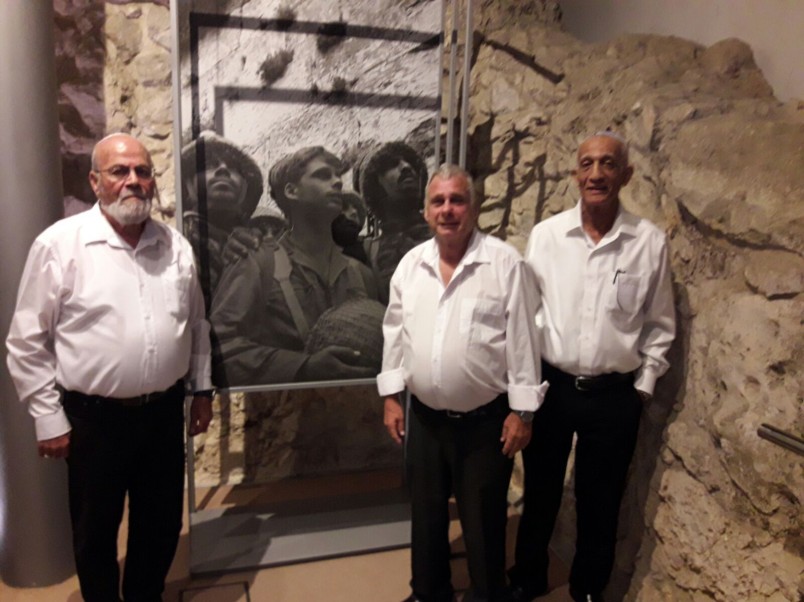The Paratrooper from the Famous Wall Liberation Photo: "We Caressed the Stones, and the Tears Flowed..."
Tzigi Karsenti, appearing in the famous Wall photo, recalls the harrowing fight that led to the liberation of the Western Wall. "We fought and stepped over bodies, losing comrades along the way, until we found ourselves before the Western Wall."
 The paratroopers in the famous photo, then and now
The paratroopers in the famous photo, then and nowFor fifty-one years, Tzigi (Zion) Karsenti has carried with him the memory of the Six-Day War, in which he was one of the liberators of the Temple Mount and the Western Wall. On the eve of Jerusalem Day, he shares his memories, and as he speaks about them, it's clear they are alive and vivid before his eyes, as if they happened yesterday.
"We were all young reservists, aged 21-22," he recalls. "Young and fighting force, with spark in our eyes, desire and determination. The mere thought of doing something for the state gave us strength. A month before the outbreak of the war, all IDF soldiers were recruited, including us paratroopers - Battalion 66, Brigade 55.
"At first, we were supposed to fight in El Arish," he remembers, "but later we received a notice that it had already been captured. Then, a few hours later, the commanding officer ordered us to board the buses again. Only while on the way did we receive the message: Battalion 66 is heading left to the Beit Fagi neighborhood of Jerusalem – now the Sanhedriyya neighborhood, between western and eastern Jerusalem.
A Bloody War
"We arrived in the darkness and were briefed by the commander who wanted to explain something to us. Then he revealed the secret: there was no war planned for Jerusalem, it was a last-minute decision. Hence, there were no ready plans or aerial photos; only at that moment were they capturing for us the targets we needed to fight – Ammunition Hill and the Police School.
"In practice," Tzigi recounts, "we began fighting around ten-thirty at night when we obtained the necessary pictures explaining what the buildings we needed to fight looked like. It was a completely dark night, with no moonlight. As we entered Ammunition Hill, we split into four companies, each knowing its precise role; I was in Company B. There was tremendous fear; we could not see a thing, but we were driven by an unparalleled determination.
"The fighting was not at all easy. As we approached the fences of Ammunition Hill, shells began to be fired at us," Tzigi recalls with a shiver. "The scenes were very difficult; heads of men were blown everywhere, cries of 'medic,' 'wounded,' were constant. We crawled through narrow trenches where we couldn't even lift our heads an inch. The trenches were narrow, and whenever a body lay there, the way was blocked, and we couldn't pass. We had to step over bodies, not knowing if they were ours or the enemy's. It was a terrible situation. The forces weren’t even beginning to be equal; we had almost no war equipment, whereas the Legionnaires had not only weapons but also bayonets. Yet, the bayonets helped us in the end to escape harm since they glinted in the dark, showing us where to aim our gunfire. We continued, advancing while fighting hand-to-hand. The war was bloody; we constantly felt that comrades were falling. We did not know how many. Eventually, most officers were killed or wounded, leading to the directive for each soldier to find his own way. Words cannot express how much we longed for dawn to break to see where we were.

The Temple Mount is in Our Hands
After Ammunition Hill, they continued to the Police School. Once both places were captured, they were ordered to advance toward the Lions' Gate.
"We descended from the Mount of Olives," he recounts, "fighting against snipers across the way. We crossed the road and split into two columns, climbing towards the Lions' Gate, continuously battling snipers. Approaching, we saw an armored vehicle in flames at the gate. We passed it, moving towards the Temple Mount. The battle was tough, snipers above us while we were below. Suddenly, we found ourselves in the Al-Aqsa Mosque and heard our brigade commander, Motta Gur, proclaim: 'The Temple Mount is in our hands. The people of Israel are awaiting our victory, onward!' Only then did we understand we had reached the climax. We understood, feared, and were thrilled."
Later, Tzigi says, they received the directive: "Cross the wall and fight through the alleys of the Old City." Here, he recounts the most emotional moments of his life: "I approached the wall, searching for a way through. I found a small, rusted iron gate, opened it, and peeked my head in. I saw iron stairs and began to descend them amidst the inferno outside, constantly battling snipers. Upon reaching the base, I discovered myself in an alley about three meters in width. I leaned against the left side, made of clay as the Jordanian homes were, then I heard our guys pushing the door and scuffling. I managed to pass through, and suddenly... (his voice chokes) the Western Wall appeared before me."
Tzigi says he will never forget those moments. "I didn't know what to do; I began crying, trembling with excitement, approached the Western Wall, and caressed the stones while tears flowed and flowed... I remember saying out loud: 'This can't be real, I can't believe I've actually reached here.' And then I found myself shouting: 'Blessed be His name forever, I'm at the Western Wall!'"
"I turned towards the stairs and saw Rabbi Goren and other rabbis with Torah scrolls, all crawling towards the Wall, moving and praying. I too pressed against the stones, caressing them and looking at them, completely trembling, and crying as Rabbi Goren hugged me. In the meantime, more soldiers started arriving, blowing the shofar."
At that moment, Tzigi says he noticed photographer David Rubinger capturing the famous photo where he is seen (on the left) with Chaim Oshri (on the right) and Itzik Yifat in the center.
"Back then, I had no idea how famous the photo would become," he notes. "I just looked around and saw more and more soldiers arriving, all covered in dust and gunpowder after forty-eight hours of bleeding battle. It was a peak moment beyond description... We all stood by the Wall and cried, every soldier cried. These were the most moving moments that could be, with soldiers continuously streaming into the narrow alley."
Then, at the height of euphoria and excitement, the three generals – Yitzhak Rabin, Moshe Dayan, and Uzi Narkiss – descended the stairs into the 'pile of soldiers' standing by the Wall. "After Moshe Dayan thanked us, he wrote a note and placed it between the Wall's stones. Curious soldiers looked at what was written and saw the following words: 'We will never, ever, ever return the Temple Mount, the Western Wall, and Jerusalem to foreign hands. They will always remain ours.'"
Thanks to the Prayers
Fifty-one years have passed since that day, and Tzigi continues to be moved. "Five days after the Wall's liberation, we were sent home. This was after a tour of all of eastern Jerusalem, concluding at Mount Scopus. But the truth is, despite the tremendous excitement and joy, most of us wandered there with our heads bowed. We couldn't stop thinking about the friends we lost, as sadly, we lost so many.
"The buses that brought us still lined up the ascent to Mount Scopus, and I stood, looking at this line – so many buses brought us, so few fighters returned home. I saw behind each bus stood a pile of gear with no one to claim it, as their owners were wounded or killed. Visibly, I saw the war's cost, and it was clear to me it was so not worthwhile. This price was bloody. Behind every piece of gear was an entire family, so many relatives and friends."
Did you ever ask yourself why you specifically survived the bloody battle?
"Of course, I asked myself many times. I can tell you my parents never wanted me to join the paratroopers, and for a long time, they didn't even know I belonged there. I am an only son among six sisters, and when my parents understood I was going to battle, they were very concerned. My sister told me after the war that during the six days, my father secluded himself in the synagogue, praying continuously, not eating or drinking, until I returned home. I too prayed nonstop. I remember standing by the Wall, telling Hashem: 'Help me just to return home safely for my parents, so they won't suffer grief...' I am sure the prayers are what pleaded for me in the heavens."

